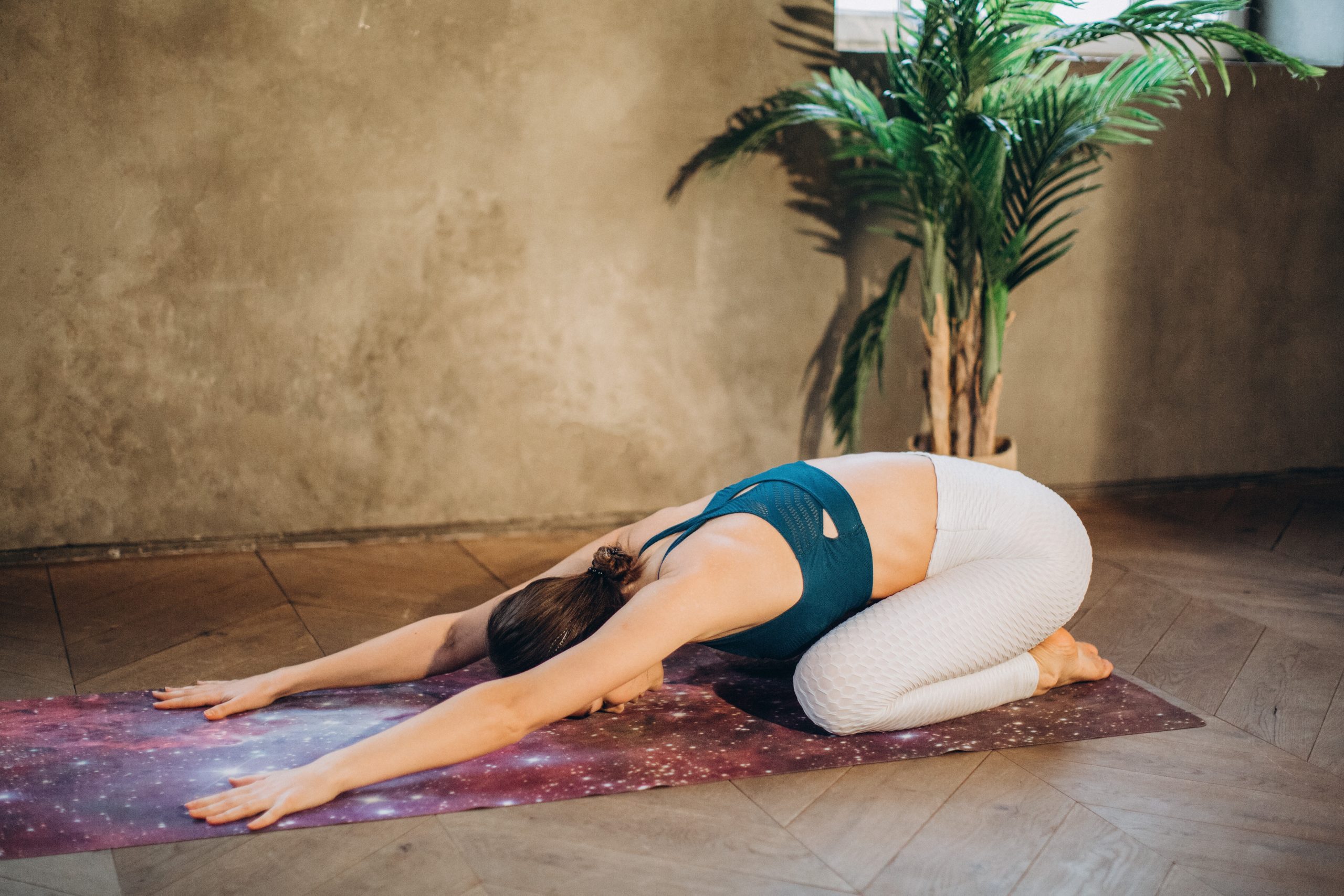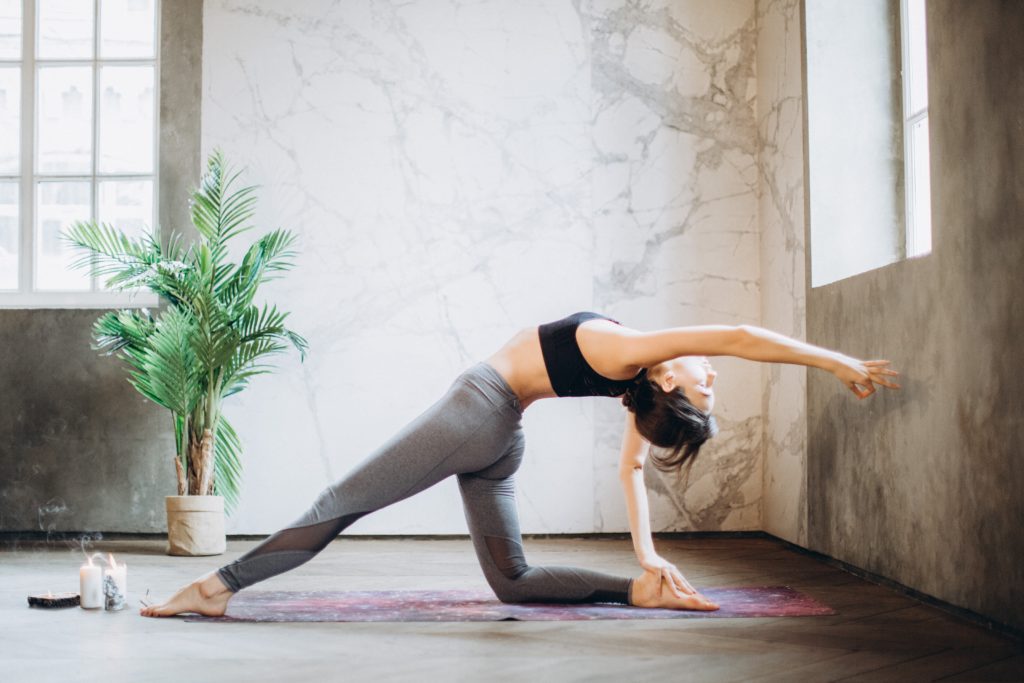People who suffer from anxiety know how much of a hassle it is to live with every day. In this article we are going to cover the best 5 yoga poses to help reduce anxiety that you can easily do anywhere and time. Whether your condition is acute or generalized, anxiety can create feelings of low self-esteem, limited control, persistent anger, defeat, fear, and panic. Yogis find that concentrating on your ability to experience each pose and your breath too can help soothe your mind from the pangs of unnecessary harmful jibber-jabber. It’s all about making yourself strong enough to battle these struggles head on. Practicing one or two poses every day for just a few minutes can have major mental health benefits, this is the reason many people turn to yoga when dark clouds of anxiety start to settle in
Observe your sensations surging throughout the whole body as you assume every posture. Allow the emotions to flow and experience them to the fullest. The moment your thoughts begin to scatter, refocus on the mat gently and continue to practice.
There are some yoga poses for anxiety known to quell the negative chain of thoughts and regain mental fortitude. There’s no need for a special class or yoga clothes to perform them. You simply need dedication, space, and the willpower to implement them. 19 Fun Facts About Yoga Everyone Should Know
Child's Pose (Balasana)

Child’s pose, also commonly referred to as a place of rest while doing yoga, is used by many to regroup and relax in between the more difficult asanas. Simply relaxing and letting the nerves calm down helps ease anxiety symptoms.
This pose helps release tension in the neck, back, and shoulders – the zones known to hold the most stress. Additionally, the pose also helps induce relaxation by promoting conscious, steady breathing, which is specifically great for people who suffer from anxiety due to the stimulation of the parasympathetics as well as the pacification of the sympathetic nervous system.
How to perform this pose:
- Start on your knees and hands with the big toes touching. Your legs must be at hips distance while the hands should be straight under your arms.
- As you bow forward, exhale and allow your torso to rest between or on your thigh, placing your forehead on the mat. Keep your arms extended and long and press into them, bringing your sit bones to your heels.
- Hold the pose for as long as required. After completion, use your hands to slowly walk your torso upwards before sitting back on your heels.
Tree Pose (Vrikasana)
Tree pose is amazing in alleviating anxiety. Through the simple tactics of standing balance, you achieve better concentration, awareness, and focus. Your mind is trained to shift focus from building anxiety to your physical self.
The fun thing about this yoga pose for anxiety is that you don’t need to be in a yoga class or even your home to perform this. You can do it for extended periods of time literally everywhere; the train, standing in line at the store, workplace. It acts as a fantastic distraction from many major and minor anxiety triggers.
How to perform this pose:
- With the feet at a distance of hips-width, stand tall and shift your weight to the right leg. Slowly bend your left knee to position the sole of the left foot against the right inner thigh, alternatively below the knee. Make sure the toes are pointing at the floor.
- Center your pelvis to keep it directly on top of your right foot. Press the foot of the bent leg (left) into your thigh while resisting with the opposite right outer thigh.
- Bring your hands into a prayer position with the thumbs at the center of the heart. You can keep staring at the ceiling or face forward. Hold this posture for two to three breaths. Now, repeat on the other side.
Warrior III (Virabhadrasana III)
If you were looking for a more challenging yoga pose for anxiety, the warrior III poses should be the one for you. If you are okay with standing leg balances, this is ideal. This pose improves coordination, core strength, posture, and balance. In addition, it prompts the abdominal region to better your digestion. Good digestion and gut health are crucial in any fight against anxiety, since studies have found that there is significant connection between the two.
Warrior III takes the attention away from your inner thoughts and channels them back to yourself – A perfect way to calm the stressed mind.
How to perform this pose:
- Keep your feet at hip-distance apart and turn to the left. Widen your stance approximately four feet apart. Rotate your right foot almost 90-degrees so your toes are pointing toward the front of the mat.
- Move your left foot about 45 degrees to create an angle toward the mat’s upper left side. Align your torso and pelvis with your right foot. Bend the adjoining knee, ensuring the feet are planted rigidly on the mat.
- Raise your arms overhead and exert your weight on the right foot, bringing the left leg up as your torso keeps lowering forward, slowly bringing the body parallel to the ground.
- Reach out by relying on the left foot’s heel, maintaining constant engagement with both feet. Your arms should now reach forward.
- Straighten the right leg before shifting your gaze at the ground a couple of feet away from you. Hold for two to three breaths. Gently lower your leg to meet the floor and repeat on the opposite side.
Headstand (Sirsasana)
A headstand is one of the most effective yoga poses for anxiety, especially when your intrinsic thoughts have gone a bit out of control. It successfully reserves your body’s blood flow, drawing your focus to your breath instead of your discomfort or anxiety.
When we stimulate and increase blood flow to the head, a primary advantage is the detoxification of our adrenals – known to contribute to a reduction in depression too.
How to perform this pose:
- Begin on your knees and hands, with your forearms positioned shoulder-width apart. Fix your elbows there and interconnect your fingers to make the pinkies touch the floor. Position your head’s crown onto the ground and nestle it within your hands.
- Tuck in your toes to get power to lift the hips high, bringing your feet towards your elbows. Work those abdominal muscles. Press your forearms on the mat and lift your shoulder, slowly removing one leg off the ground. Stick to practice lifting just one leg and you can do the other when you’re steadier.
- To perform a full headstand, bring your feet directly over your hips and shoulder until they are totally straight overhead.
- If you’re a newbie to headstands, you can practice close to a wall for support. Fix your gaze and hold for five to six breaths – longer if desired.
- After you’re done with this pose, lower your feet down slowly, one at a time. Take your knees back down onto the mat and rest for three breaths in child’s pose.
Legs Up the Wall Pose (Viparita Karani)
This one is quite a popular yoga pose for anxiety amoungst those who have ever taken a restorative yoga class. Legs up the wall is amazing for easing anxiety and relieving lower back pain.
This pose can be performed at any time given a wall is present; however, we strongly recommend choosing a comfortable place; silent and serene so you can truly experience the benefits. You can set a blanket or pillow underneath your lumbar spine to soothe lower back pressure to.
How to perform this pose:
- Roll your yoga mat up about halfway and keep it directly against the wall. Sit on either your right or left side, keeping a close distance to the wall.
- In one steady movement, with your head and shoulders on the mat, swing your legs up the wall. Gently bring yourself forward towards the wall until the hamstring area and buttocks are touching it. Your feet should now be resting up the wall directly above your hips, as shown in the picture above.
- Next close your eyes and return to the breath. Hold this posture if you can for 10 minutes to gain maximum benefits. Once you’re done there, swing your legs to the right or left of your body to come out of the position.
Bottom Line
Anxiety and stress trigger the release of cortisol, which activates “trigger” points, prominently around the spine, in our sympathetic and parasympathetic nervous system. By consistantly dedicating your time to yoga on a daily basis will bring you amazing results. The cortisol, stress response, and adrenaline levels will start to balance out easier and in turn your anxiety symptons should reduce rapidly.
Also, reminder! Don’t beat yourself up if you can’t perform a challenging posture. Yoga teaches us to be present and how to navigate through the resistance with your breath, it is not driven by the end results on a hunt for perfection.
So, these were the yoga poses for anxiety that help us work on our brain chemistry. This is your calling to grab a mat and practice some deep belly breaths.
